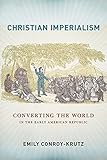Christian Imperialism : Converting the World in the Early American Republic / Emily Conroy-Krutz.
Material type: TextSeries: The United States in the WorldPublisher: Ithaca, NY : Cornell University Press, [2015]Copyright date: ©2015Description: 1 online resource (264 p.) : 5 halftones, 3 mapsContent type:
TextSeries: The United States in the WorldPublisher: Ithaca, NY : Cornell University Press, [2015]Copyright date: ©2015Description: 1 online resource (264 p.) : 5 halftones, 3 mapsContent type: - 9781501701047
- Christianity and politics -- United States -- History -- 19th century
- Missions, American -- History -- 19th century
- Political messianism -- United States -- History -- 19th century
- Christianity
- Religious Studies
- U.S. History
- HISTORY / United States / 19th Century
- Christianity, Christian imperialism, American Board of Commissioners for Foreign Missions, missionary impulse, American evangelical Protestants, early nineteenth century, international relations, foreign relations, Anglo-American civilization, American missionary history, American religious history
- 266.02373 23
- BV2410 .C66 2016
- online - DeGruyter
| Item type | Current library | Call number | URL | Status | Notes | Barcode | |
|---|---|---|---|---|---|---|---|
 eBook
eBook
|
Biblioteca "Angelicum" Pont. Univ. S.Tommaso d'Aquino Nuvola online | online - DeGruyter (Browse shelf(Opens below)) | Online access | Not for loan (Accesso limitato) | Accesso per gli utenti autorizzati / Access for authorized users | (dgr)9781501701047 |
Browsing Biblioteca "Angelicum" Pont. Univ. S.Tommaso d'Aquino shelves, Shelving location: Nuvola online Close shelf browser (Hides shelf browser)

|

|

|

|

|

|

|
||
| online - DeGruyter Reforming New Orleans : The Contentious Politics of Change in the Big Easy / | online - DeGruyter Buttoned Up : Clothing, Conformity, and White-Collar Masculinity / | online - DeGruyter From She-Wolf to Martyr : The Reign and Disputed Reputation of Johanna I of Naples / | online - DeGruyter Christian Imperialism : Converting the World in the Early American Republic / | online - DeGruyter Suffrage Reconstructed : Gender, Race, and Voting Rights in the Civil War Era / | online - DeGruyter Whose Bosnia? : Nationalism and Political Imagination in the Balkans, 1840–1914 / | online - DeGruyter Winter in the Wilderness : A Field Guide to Primitive Survival Skills / |
Frontmatter -- Contents -- Acknowledgments -- Prologue: An American Missionary in London -- Introduction: Christian Imperialism and American Foreign Missions -- 1. Hierarchies of Heathenism -- 2. Missions on the British Model -- 3. Mission Schools and the Meaning of Conversion -- 4. Missions as Settler Colonies -- 5. American Politics and the Cherokee Mission -- 6. Missionaries and Colonies -- 7. A “Christian Colony” in Singapore -- Conclusion: Missions and American Imperialism -- Notes -- Index
restricted access online access with authorization star
http://purl.org/coar/access_right/c_16ec
In 1812, eight American missionaries, under the direction of the recently formed American Board of Commissioners for Foreign Missions, sailed from the United States to South Asia. The plans that motivated their voyage were ano less grand than taking part in the Protestant conversion of the entire world. Over the next several decades, these men and women were joined by hundreds more American missionaries at stations all over the globe. Emily Conroy-Krutz shows the surprising extent of the early missionary impulse and demonstrates that American evangelical Protestants of the early nineteenth century were motivated by Christian imperialism—an understanding of international relations that asserted the duty of supposedly Christian nations, such as the United States and Britain, to use their colonial and commercial power to spread Christianity. In describing how American missionaries interacted with a range of foreign locations (including India, Liberia, the Middle East, the Pacific Islands, North America, and Singapore) and imperial contexts, Christian Imperialism provides a new perspective on how Americans thought of their country’s role in the world. While in the early republican period many were engaged in territorial expansion in the west, missionary supporters looked east and across the seas toward Africa, Asia, and the Pacific. Conroy-Krutz’s history of the mission movement reveals that strong Anglo-American and global connections persisted through the early republic. Considering Britain and its empire to be models for their work, the missionaries of the American Board attempted to convert the globe into the image of Anglo-American civilization.
Mode of access: Internet via World Wide Web.
In English.
Description based on online resource; title from PDF title page (publisher's Web site, viewed 26. Apr 2024)


